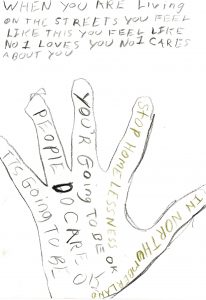9. Primary Care & Nursing

Artist: Jason Coombes
Health and housing security are positively correlated variables. This consistent research outcome tells us the simple fact that people who have stable housing tend to be in better health than those who do not. The flipside of this is also true. As housing security decreases – as a person becomes at risk of losing their housing or becomes homeless – their health gets worse. When people experience homelessness, they tend to also experience a range of chronic conditions that go along with it. These include diabetes, chronic lung issues such as COPD and emphysema, fatigue, skin conditions, dental problems, and foot problems.
Yet, despite having generally poorer health than housed individuals, people who experience homelessness also are more likely to report they do not have a primary care provider, such as a Family Physician or Nurse Practitioner. Accessing mainstream healthcare in this way often requires that a person have a valid health card, address where they can receive mailings, and a phone number where they can be contacted to book appointments and follow-ups. These requirements are not always conducive to the realities of being homeless, and not having an address, phone, or proper documentation. Canada has a highly regarded health care system, but it does not work as well as it could (and should) for our most vulnerable citizens.

